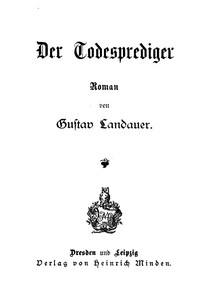Der Todesprediger by Gustav Landauer
"Der Todesprediger" by Gustav Landauer is a novel written in the late 19th century. The story chronicles the life of Karl Starkblom, the second son of a shoemaker, as he navigates a world steeped in philosophical disillusionment, personal loss, and existential questioning. The narrative explores profound themes, including individual purpose, societal duty, and the search for meaning in a life marked by both promise and despair. The opening of the novel introduces
readers to the philosophical underpinnings that will shape the protagonist's journey. Karl Starkblom is presented as a deeply introspective character, who reflects on his tumultuous childhood and his family's decline, particularly focusing on the shortcomings of his father. As he transitions into adulthood, Karl grapples with the tensions between his early aspirations for a philosophical life and the practical demands of a legal career. The narrative highlights his internal struggles, questioning societal norms and the worth of human existence amidst personal tragedies. It sets the stage for his eventual awakening and desire to engage more deeply with the world around him, questioning life's greater meaning and his role within it. (This is an automatically generated summary.)
Read or download for free
| Reading Options | Url | Size | |||
|---|---|---|---|---|---|
| Read now! | https://www.gutenberg.org/ebooks/68228.html.images | 326 kB | |||
| EPUB3 (E-readers incl. Send-to-Kindle) | https://www.gutenberg.org/ebooks/68228.epub3.images | 217 kB | |||
| EPUB (older E-readers) | https://www.gutenberg.org/ebooks/68228.epub.images | 216 kB | |||
| EPUB (no images, older E-readers) | https://www.gutenberg.org/ebooks/68228.epub.noimages | 199 kB | |||
| Kindle | https://www.gutenberg.org/ebooks/68228.kf8.images | 294 kB | |||
| older Kindles | https://www.gutenberg.org/ebooks/68228.kindle.images | 262 kB | |||
| Plain Text UTF-8 | https://www.gutenberg.org/ebooks/68228.txt.utf-8 | 297 kB | |||
| Download HTML (zip) | https://www.gutenberg.org/cache/epub/68228/pg68228-h.zip | 277 kB | |||
| There may be more files related to this item. | |||||
Similar Books
About this eBook
| Author | Landauer, Gustav, 1870-1919 |
|---|---|
| Title | Der Todesprediger |
| Original Publication | Germany: Verlag von Heinrich Minden,1893. |
| Credits | Digitale Sammlungen der Universitäts- und Landesbibliothek der Heinrich Heine Universität Düsseldorf |
| Reading Level | Reading ease score: 81.2 (6th grade). Easy to read. |
| Language | German |
| LoC Class | PT: Language and Literatures: Germanic, Scandinavian, and Icelandic literatures |
| Subject | German fiction -- 19th century |
| Category | Text |
| EBook-No. | 68228 |
| Release Date | Jun 6, 2022 |
| Most Recently Updated | Oct 18, 2024 |
| Copyright Status | Public domain in the USA. |
| Downloads | 280 downloads in the last 30 days. |
| Project Gutenberg eBooks are always free! | |

